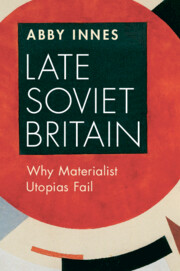Book contents
- Late Soviet Britain
- Late Soviet Britain
- Copyright page
- Epigraph
- Contents
- Figures
- Acknowledgements
- Introduction
- Part I The Materialist Utopias
- 1 Rationality and Closed-System Reasoning
- 2 General Equilibrium and the Balanced Plan
- 3 On Bureaucracy
- 4 On ‘Organised Forgetting’ in the Governing Science
- Part II Britain’s Neoliberal Revolution
- Part III The Rise and Fall of the Neoliberal ‘Movement Regime’
- Index
2 - General Equilibrium and the Balanced Plan
from Part I - The Materialist Utopias
Published online by Cambridge University Press: 14 September 2023
- Late Soviet Britain
- Late Soviet Britain
- Copyright page
- Epigraph
- Contents
- Figures
- Acknowledgements
- Introduction
- Part I The Materialist Utopias
- 1 Rationality and Closed-System Reasoning
- 2 General Equilibrium and the Balanced Plan
- 3 On Bureaucracy
- 4 On ‘Organised Forgetting’ in the Governing Science
- Part II Britain’s Neoliberal Revolution
- Part III The Rise and Fall of the Neoliberal ‘Movement Regime’
- Index
Summary
This chapter explores why the promises of allocative efficiency in neoliberal and Soviet economics - neoclassical ‘general equilibrium’ and the Soviet's ‘balanced plan’ - cannot be fulfilled. Early Soviet conceptions of planning had aspired to be based on an evolving social reality, in contrast to the highly abstract, competition-based, and hence de-historicized neoclassical arguments for general equilibrium. The Stalinist shift to synoptic planning had nevertheless confronted Soviet economists with the same challenges their neoclassical colleagues faced in the west: that of how to produce essentially machine-like models of allocative efficiency in social reality. These challenges would drive later generations of Soviet and neoclassical economists to fixate on, and fail to solve, the problem of how to account for the information that was evidently ‘lost’ both in planning and in market mechanisms. Innes explains why both concepts of allocative efficiency had proved even theoretically incoherent by the 1970s, and demonstrates that it was at this, the lowest point of intellectual credibility for the theory of general equilibrium, that it became a foundation of neoliberal orthodoxy.
- Type
- Chapter
- Information
- Late Soviet BritainWhy Materialist Utopias Fail, pp. 51 - 76Publisher: Cambridge University PressPrint publication year: 2023



